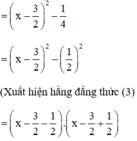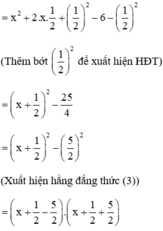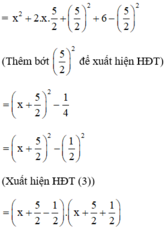Phân tích đa thức thành nhân tử.
x2 -3x + 2
Hãy nhập câu hỏi của bạn vào đây, nếu là tài khoản VIP, bạn sẽ được ưu tiên trả lời.


`
` x^2 – 3x + 2`
`= x^2 – x – 2x + 2` (Tách `–3x = – x – 2x)`
`= (x^2 – x) – (2x – 2)`

Cách 1: Tách một hạng tử thành tổng hai hạng tử để xuất hiện nhân tử chung.
a) x2 – 3x + 2
= x2 – x – 2x + 2 (Tách –3x = – x – 2x)
= (x2 – x) – (2x – 2)
= x(x – 1) – 2(x – 1) (Có x – 1 là nhân tử chung)
= (x – 1)(x – 2)
Hoặc: x2 – 3x + 2
= x2 – 3x – 4 + 6 (Tách 2 = – 4 + 6)
= x2 – 4 – 3x + 6
= (x2 – 22) – 3(x – 2)
= (x – 2)(x + 2) – 3.(x – 2) (Xuất hiện nhân tử chung x – 2)
= (x – 2)(x + 2 – 3) = (x – 2)(x – 1)
b) x2 + x – 6
= x2 + 3x – 2x – 6 (Tách x = 3x – 2x)
= x(x + 3) – 2(x + 3) (có x + 3 là nhân tử chung)
= (x + 3)(x – 2)
c) x2 + 5x + 6 (Tách 5x = 2x + 3x)
= x2 + 2x + 3x + 6
= x(x + 2) + 3(x + 2) (Có x + 2 là nhân tử chung)
= (x + 2)(x + 3)
Cách 2: Đưa về hằng đẳng thức (1) hoặc (2)
a) x2 – 3x + 2

(Vì có x2 và  nên ta thêm bớt
nên ta thêm bớt  để xuất hiện HĐT)
để xuất hiện HĐT)

= (x – 2)(x – 1)
b) x2 + x - 6

= (x – 2)(x + 3).
c) x2 + 5x + 6

= (x + 2)(x + 3).

a) \(5x^3-10x^2+15x=5x\left(x^2-2x+3\right)\)
b) \(x^2-3x+2=x\left(x-2\right)-\left(x-2\right)=\left(x-2\right)\left(x-1\right)\)

1: \(-x^2+2x+8\)
\(=-\left(x^2-2x-8\right)\)
\(=-\left(x-4\right)\left(x+2\right)\)
2: \(2x^2-3x+1=\left(x-1\right)\left(2x-1\right)\)

\(\left(x^2+4x+8\right)^2+3x\left(x^2+4x+8\right)+2x^2=\left(x^2+4x+8+\dfrac{3}{2}x\right)^2-\dfrac{1}{4}x^2=\left(x^2+\dfrac{11}{2}x+8\right)^2-\left(\dfrac{1}{2}x\right)^2=\left(x^2+\dfrac{11}{2}x+8-\dfrac{1}{2}x\right)\left(x^2+\dfrac{11}{2}x+8+\dfrac{1}{2}x\right)=\left(x^2+5x+8\right)\left(x^2+6x+8\right)=\left(x+2\right)\left(x+4\right)\left(x^2+5x+8\right)\)
\(\left(x^2+4x+8\right)^2+3x\left(x^2+4x+8\right)+2x^2\)
\(=\left(x^2+4x+8\right)^2+x\left(x^2+4x+8\right)+2x\left(x^2+4x+8\right)+2x^2\)
\(=\left(x^2+4x+8\right)\left(x^2+5x+8\right)+2x\left(x^2+5x+8\right)\)
\(=\left(x^2+5x+8\right)\left(x+2\right)\left(x+4\right)\)
phân tích các đa thức thành nhân tử
a) ( x2 + 4)2- 16x2
b) ( x+3)2- 8x3
c) (4x2-3x -18)2- ( 4x2 + 3x)2

\(a,\left(x^2+4\right)^2-16x^2=\left(x^2+4\right)-\left(4x\right)^2=\left(x^2+4-4x\right).\left(x^2+4+4x\right)=\left(x-2\right)^2.\left(x+2\right)^2\)
\(b,\left(x+3\right)^3-8x^3=\left(x+3\right)^3-\left(2x\right)^3=\left(x+3-2x\right).\left[x^2+\left(x+3\right).2x+\left(2x\right)^2\right]=\left(3-x\right).\left(x^2+2x^2+6x+4x^2\right)\)
\(c,\left(4x^2-3x-18\right)^2-\left(4x^2+3x\right)^2=\left(4x^2-3x-18-4x^2-3x\right).\left(4x^2-3x-18+4x^2+3x\right)=\left(-6x-18\right).\left(8x^2-18\right)\)

1/(x+2)2 -(3x-1)2=(x+2+3x-1)(x+2-3x+1)=4x(-2x+3)=-8x2+12x
2/(x4+x2)(-2x3-2x)=x2(x2+1)-2x(x2+1)=(x2+1)(x2-2x)

a: Ta có: \(x^2-xy-3x+3y\)
\(=x\left(x-y\right)-3\left(x-y\right)\)
\(=\left(x-y\right)\left(x-3\right)\)
b: Ta có: \(5x^2+5xy-x-y\)
\(=5x\left(x+y\right)-\left(x+y\right)\)
\(=\left(x+y\right)\left(5x-1\right)\)
c: Ta có: \(x^2-2xy+y^2-z^2\)
\(=\left(x-y\right)^2-z^2\)
\(=\left(x-y-z\right)\left(x-y+z\right)\)
\(x^2-3x+2=x^2-x-2x+2=x\left(x-1\right)-2\left(x-1\right)=\left(x-1\right)\left(x-2\right)\)